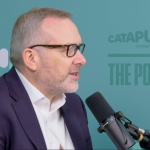
Growing older healthily in an ageing society

This article features in the first edition of the Connected Places Magazine
By 2050, a quarter of the UK population will be over 65. That compares to less than 15% today. That’s why it’s vital we take an innovative and practical approach to building a future that prioritises physical and mental health as we grow older.
When it comes to healthy ageing, few UK homes are currently up to the challenge of supporting us throughout our lives. The UK has some of the oldest housing stock in Europe – 80% of the homes we’ll be living in by 2050 have already been built. But with the right technologies and innovative care solutions, we can get more from our homes for longer.
Tapping into the right technologies and innovations will mean the UK can:
“One of the things that COVID has taught us is we don’t want to die in a care home. Most people now want to spend the last years of their life in their (own) home. And I think that that’s going to be an enormously important issue.”Professor Lynda Gratton, Professor of Management Practice at the London Business School and best-selling author
In future, we will need smart homes to keep pace with the innovation around us. As Nigel Walley, Founder & MD of Chimni, puts it: the challenge is “to establish the role of smart homes in the emerging vision for smart, connected cities.” This means homes will need to connect intelligently to utilities and other networked services. But, as Walley points out, “Councils are currently struggling with legacy IT systems and budget constraints, so the private sector is going to have to step in and support them.”
Through the Homes for Healthy Ageing Programme, Connected Places Catapult is harnessing the expertise of industry leaders who can help us make the most of our existing infrastructure through scalable, consumer-friendly technology solutions.
The programme’s work is already underway. Its healthy ageing testbeds are gathering and testing new ideas and solutions in the area
of social isolation and improving cold and
damp homes.
“Wouldn’t it be great to have AI-enabled wheelchairs that can understand and act upon voice commands or eye movement to really enable mobilityu0026lt;br /u0026gt;nfor all?”Scott Summers, CEO of Fuzzlab,a UK tech company specialising in AI products and services for the housing sector
The artificial intelligence company revolutionising care

Thriving.ai is a digital application that unites all those providing care to an individual – the ‘Thriver’. Using one single platform saves time and money, and improves coordination, communication and quality of care.
As Shainoor Khoja, Founder and CEO, explains, “Caregiving is fragmented, siloed and has been underinvested in. Thriving.ai enables integrated care so everyone is on the same page, and can connect in real time.
“Underpinned by machine learning and artificial intelligence, Thriving.ai delivers intelligent prompts, real-time data insights and more targeted engagement of Thrivers to help address issues of loneliness and isolation.”
Working with Connected Places Catapult has helped Thriving.ai secure opportunities to pilot their solution and generate evidence for whether their app improves an individual’s care. Their help has given Thriving.ai access to inputs on data security in collaboration with the ICO, and the chance to talk to – and design with – care providers.
“The programme has helped us tighten up our hypotheses and ensure we’re designing our pilot as independently as we can. It has specifically helped us meet with decision-makers and gain a deeper understanding of our target market.
“Advances in integrated, connected care technology will continue to deliver greater independence, healthier lifestyles, and lower costs for Thrivers.”
The data scientists predicting cold AND Damp
Bays Consulting, in partnership with Parity projects, runs Prediction to Prescription: a service that applies data science to identify and address cold and damp in homes. They’ve been working with the Catapult to help refine and showcase their idea. The programme has also helped them work on in-house research and development, and a long-term product development plan.
Sophie Carr, Director at Bays Consulting, explains more. “Our service is unique. It predicts the presence of cold and damp at the individual home level. It’s also accessed through a secure cloud-based portal, so different care teams can log in to one solution and use the same evidence to inform their decisions.
Working on the Homes for Healthy Ageing programme has provided great access to a wide range of stakeholders. They’ve also enabled us to link with Connected Places Catapult to develop a clear experimental design plan and access a far wider knowledge base.
“Future homes will need to meet the changing needs of an ageing population – including digital and transport accessibility. Our work with the Homes for Healthy Ageing programme can help make this happen.”
The Grand Challenge
The UK’s ‘ageing society’ is one of the UK government’s four Grand Challenges and its mission is to help people enjoy at least five extra healthy, independent years while narrowing the gap between the experiences of the richest and poorest.
But housing and health have until now been treated as two very different and disconnected worlds, which poses an opportunity for innovators and entrepreneurs in both the housing and the healthy living industries to introduce new technology and care solutions.
Do you have a solution to making our homes better suited to people as they age? The next round of our Homes for Healthy Ageing programme is currently accepting applications.





